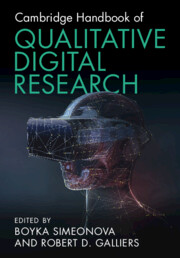Book contents
- Cambridge Handbook of Qualitative Digital Research
- Cambridge Handbook of Qualitative Digital Research
- Copyright page
- Contents
- Figures
- Tables
- Contributors
- Preface
- Part I Philosophical, Epistemological and Theoretical Considerations
- Chapter 1 Introduction
- Chapter 2 A Philosophical Perspective on Qualitative Research in the Age of Digitalization
- Chapter 3 Data as a Contingent Performance and the Limitations of Big Data
- Chapter 4 Big Data, Little Understanding
- Chapter 5 Power, Knowledge and Digitalization
- Chapter 6 Information Technology and Power
- Part II Methodological Considerations
- Part III Illustrative Examples and Emergent Issues
- Index
- References
Chapter 6 - Information Technology and Power
from Part I - Philosophical, Epistemological and Theoretical Considerations
Published online by Cambridge University Press: 08 June 2023
- Cambridge Handbook of Qualitative Digital Research
- Cambridge Handbook of Qualitative Digital Research
- Copyright page
- Contents
- Figures
- Tables
- Contributors
- Preface
- Part I Philosophical, Epistemological and Theoretical Considerations
- Chapter 1 Introduction
- Chapter 2 A Philosophical Perspective on Qualitative Research in the Age of Digitalization
- Chapter 3 Data as a Contingent Performance and the Limitations of Big Data
- Chapter 4 Big Data, Little Understanding
- Chapter 5 Power, Knowledge and Digitalization
- Chapter 6 Information Technology and Power
- Part II Methodological Considerations
- Part III Illustrative Examples and Emergent Issues
- Index
- References
Summary
The exponential development of information technologies (IT) which has been described as the digital revolution has led to different IT outcomes at individual, organizational and societal levels. The chapter theorizes these different IT outcomes as digitally led emancipation and digitally led exploitation. The chapter postulates that the attainment of the outcomes depends on different power mechanisms and their associated fault lines. Power mechanisms and IT are theorized to create a framework explicating these dynamics. Power mechanisms are outlined as episodic power and digitally led emancipation (collective action, participation), episodic power and digitally led exploitation (manipulation, information asymmetries), systemic power and digitally led emancipation (empowerment, inclusion) and systemic power and digitally led exploitation (surveillance/monitoring, automation/algorithmification). The chapter concludes with a research agenda to understand these power mechanisms, which may enable digitally led emancipation and digitally led exploitation.
Keywords
- Type
- Chapter
- Information
- Cambridge Handbook of Qualitative Digital Research , pp. 77 - 88Publisher: Cambridge University PressPrint publication year: 2023

